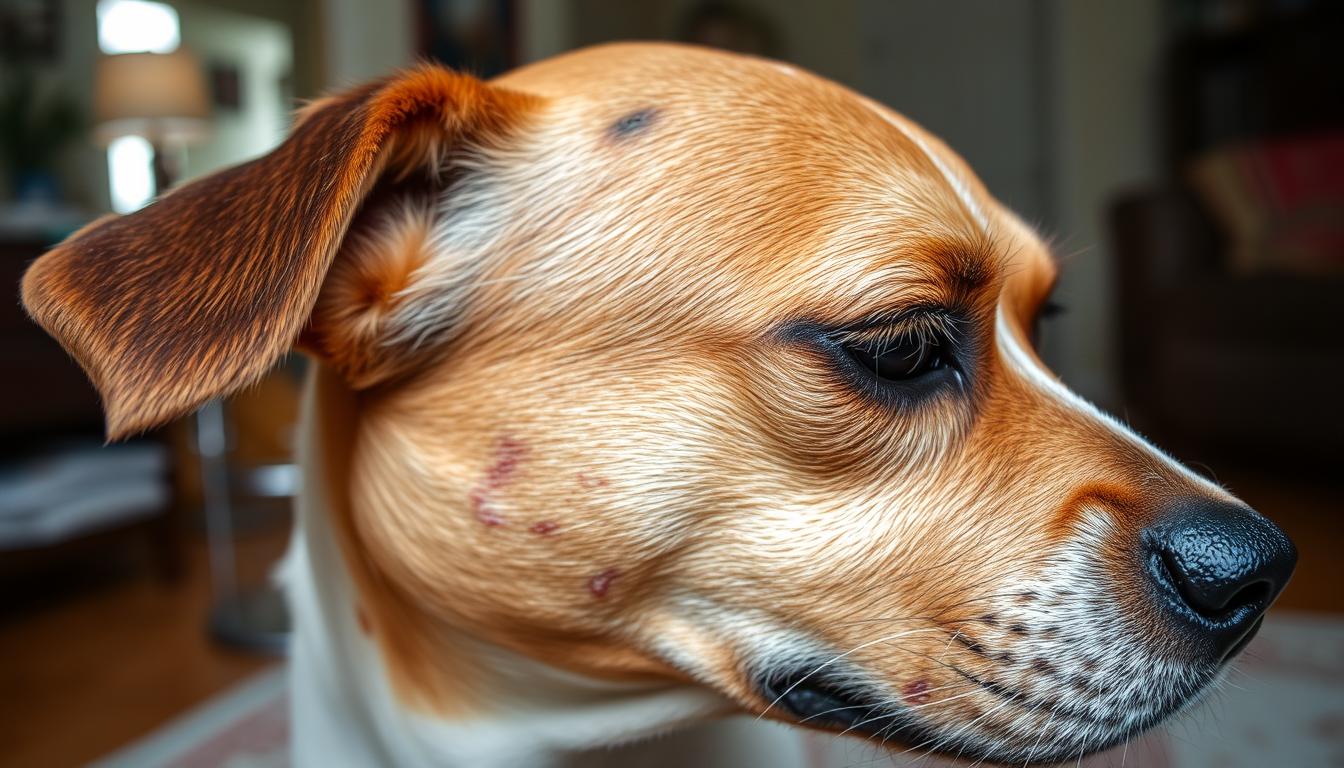As a devoted pet owner, you want your furry friend to be comfortable and healthy. But when your dog’s skin gets dry, flaky, and irritated, it’s heartbreaking. Dry skin in dogs can be caused by many things, like the environment or health issues. The good news is, you can help your dog get a healthy coat again and prevent dry skin in the future.
Table of Contents
What is Dog Dry Skin?
Dry skin in dogs can be a big problem for both pets and their owners. It makes the skin flaky, itchy, and irritated. Knowing the signs is key to helping your dog feel better.
Signs and Symptoms of Dry Skin in Dogs
The signs of dry skin in dogs can vary. But common ones include:
- Flaky, dandruff-like skin
- Excessive scratching or licking
- Redness, inflammation, or irritation
- Visible skin lesions or scabs
- Dull, coarse, or brittle fur
If you see any of these signs, it’s time to see a vet. They can check for health problems that need treatment.
Research shows dogs with short hair are more likely to have dry skin. Poor diet and mild dehydration can also cause it.
“Allergies are a common cause of dry skin in dogs, often heightened during springtime.”
Weather and indoor heating can make dry skin worse. Regular grooming and moisturizing shampoos can help.
Causes of Dry Skin in Dogs
Dogs can get dry skin from many reasons. These include things outside and inside their bodies. Knowing why is key to keeping their skin moist and healthy.
External Factors Contributing to Dry Skin
Things like dry air and cold weather can make a dog’s skin dry. So can bad bathing habits. Also, skin problems and bugs like fleas can make it worse.
- Dry, cold weather and indoor heat can make skin dry.
- Allergies, especially in seasons, can make skin sensitive and itchy.
- Using harsh shampoos too often can take away skin oils.
- Bugs like fleas, ticks, and mites can irritate and inflame the skin.
Internal Factors Causing Dry Skin
Some health issues inside a dog can also cause dry skin. This includes hormonal problems, not getting enough nutrients, and even cancer. Keeping a balanced diet and treating health problems is important for skin health.
- Hormonal issues like Cushing’s disease or hypothyroidism can mess with skin moisture.
- Not eating enough nutrients, especially Omega-3 fatty acids, can make skin dry.
- Certain cancers, like lymphoma or mast cell tumors, can show up as skin problems.
- Autoimmune diseases can cause skin to crust, lose hair, and get dry.
By finding and fixing the reasons for dry skin, you can help your dog stay healthy. Talking to a vet is a good idea to figure out the best plan.
Preventing Dry Skin in Dogs
Keeping your dog’s skin healthy is key to their happiness. Many reasons for dry skin in dogs can be stopped with the right care. By using these tips, you can keep your dog’s skin moist and healthy. This will prevent them from feeling uncomfortable and avoid serious problems.
- Use a broad-spectrum parasite prevention program to control fleas, ticks, and other external parasites that can irritate the skin.
- Schedule regular veterinary check-ups to ensure your dog’s skin and coat are in good condition and identify any underlying health concerns.
- Avoid over-bathing your dog and steer clear of harsh shampoos that can strip away natural oils. Opt for gentle, moisturizing pet-safe products instead.
- Brush your dog’s coat regularly to distribute natural oils and keep the skin well-conditioned.
- Provide a balanced, nutrient-rich diet that includes essential fatty acids to support skin and coat health.
| Preventative Measure | Benefit |
|---|---|
| Parasite Prevention | Protects against external parasites that can cause skin irritation and dryness |
| Veterinary Check-ups | Allows for early detection and management of any underlying health issues |
| Gentle Bathing and Grooming | Maintains the skin’s natural oil balance and hydration levels |
| Balanced Diet | Provides essential nutrients to support healthy skin and coat |
By following these ways to prevent dog dry skin, tips for maintaining healthy dog skin, and methods to avoid canine skin issues, you can help ensure your furry friend enjoys a lustrous coat and comfortable, well-nourished skin.
dog dry skin
Finding out why your dog has dry, flaky skin can be tricky. Some skin issues are easy to spot, but others need a vet’s help. Your vet will do a physical check, look at your dog’s medical history, and might do tests to find the cause.
Your vet might do skin scrapes, allergy tests, or other tests to find out why your dog’s skin is dry. They’ll check for infections, fleas, and allergies. They’ll also think about your dog’s breed and any health problems it might have.
Health issues like Cushing’s disease, hypothyroidism, or cancer can also cause dry skin. Your vet will work to find the problem and come up with a plan to fix it.
Working with your vet is key to solving your dog’s dry skin problem. With the right diagnosis and treatment, your dog can have healthy, comfortable skin again.

“Identifying the underlying cause of a dog’s dry skin is crucial for finding the right solution. A veterinarian’s expertise is invaluable in this process.”
Treating Dry Skin in Dogs
Dealing with dry skin in your dog can be tough. But, there are good ways to fix it. The right treatment depends on why the skin is dry. It could be because of the environment or a health issue.
Simple changes can help if the dry skin comes from the environment. Using a humidifier or changing how often you bathe your dog can help a lot. Also, giving your dog supplements with omega-3 fatty acids and vitamins can make their skin and coat healthier.
If your dog has allergies or other skin problems, your vet might give them special shampoos or medicine. It’s important to talk to a vet to find out what’s wrong and how to fix it.
Coconut oil is a great home remedy for dry dog skin. It’s full of vitamin E and can make the skin feel better. Oatmeal baths are also good because they calm down irritated skin.
| Treating Dry Skin in Dogs | Description |
|---|---|
| Environmental Adjustments | Using a humidifier, adjusting bathing frequency, and managing indoor air quality can help address environmental factors contributing to dry skin. |
| Dietary Supplements | Omega-3 fatty acids and vitamins in supplements can nourish the skin from the inside, promoting a healthy coat and preventing dryness. |
| Medicated Treatments | Veterinarian-prescribed shampoos, antihistamines, antibiotics, or antifungals may be necessary to treat underlying medical conditions causing dry skin. |
| Natural Remedies | Coconut oil and oatmeal baths can soothe and hydrate the skin, providing a natural solution for managing dog dry skin. |
Fixing dry skin in dogs needs a full plan. You should work with your vet and use different treatments. This way, you can make your dog’s skin healthy again and keep them comfortable.
Home Remedies for Dog Dry Skin
While it’s best to see a vet for your dog’s dry skin, you can try some home remedies. These DIY solutions can help soothe your dog’s dry, flaky skin.
Using a humidifier can add moisture to the air. This helps keep your dog’s skin from drying out. An oatmeal bath is also good. Oatmeal has antioxidants and anti-inflammatory properties that moisturize the skin.
An epsom salt bath can also help. The magnesium in the salts reduces inflammation and promotes healing. After the bath, use a gentle shampoo and conditioner to keep the skin moisturized.
Good grooming is key for managing dry skin. Brushing your dog regularly helps distribute natural oils and removes dead skin. Applying coconut oil or omega-rich fish oil can also hydrate the skin.
While these remedies can help, see a vet if your dog’s skin doesn’t get better. They can find the cause and suggest the best treatment.
| Home Remedy | How It Helps |
|---|---|
| Humidifier | Adds moisture to the air to prevent skin from drying out |
| Oatmeal Bath | Contains antioxidants and anti-inflammatory properties to soothe and moisturize skin |
| Epsom Salt Soak | Magnesium-rich salts reduce inflammation and promote healing |
| Coconut Oil or Fish Oil | Nourishing oils that hydrate and condition the skin and coat |
| Proper Grooming | Brushing distributes natural oils and removes excess dead skin |

Remember, while home remedies can offer temporary relief, always consult a vet for persistent dry skin. They can find the cause and suggest the best treatments.
When to See a Vet for Dog Dry Skin
Dandruff and dry skin in dogs are serious issues. You should see a vet if your dog shows signs like open sores, itchy skin, or a bad smell. Also, if the skin problems don’t get better or get worse, it’s time to visit the vet.
Dogs can get skin problems from many things, like the environment or health issues. Even if your dog has mild dandruff, any big changes in their skin or fur need a vet’s check. Early treatment is key to keep your dog healthy and happy.
Signs That Indicate Veterinary Care is Needed
- Persistent or worsening dandruff or dry, flaky skin
- Excessive itching, scratching, or licking of the affected areas
- Visible skin irritation, redness, or inflammation
- Presence of open sores, lesions, or hot spots
- Foul odor emanating from the skin or coat
- Thinning, patchy, or dull-looking fur
- Visible signs of external parasites, such as fleas or mites
If your dog shows any of these signs, it’s time to see a vet. They can find out why and treat it. Ignoring these signs can make things worse and harm your dog’s health.
| Situation | Veterinary Care Needed |
|---|---|
| Open sores or skin lesions | Yes, immediate attention required |
| Itchy, inflamed skin | Yes, to identify and address the cause |
| Foul skin odor | Yes, could indicate an infection |
| Visible parasites | Yes, to diagnose and treat the infestation |
| Worsening or persistent dry skin | Yes, to determine the underlying reason |
Any changes in your dog’s skin or fur need quick action. A vet can help with when to take dog to vet for dry skin. They can also help with signs dog skin issue requires veterinary care and situations needing professional treatment for canine skin problems.
Conclusion
Keeping your dog’s skin healthy is key to their overall well-being. Understanding what causes dry, flaky skin helps you prevent and treat it. This way, you can keep your pet happy and healthy.
To keep your dog’s skin in top shape, follow a balanced bathing routine. Use gentle, pH-optimized shampoos. Products like PettoGard® Hypoallergenic Foam Shampoo are great for this. Also, make sure their environment has the right humidity levels.
Don’t forget about your dog’s diet and any health issues they might have. If you’re unsure, always consult with a vet. This can help a lot in keeping their skin healthy.
It’s very important to address skin problems in dogs. Dry skin can lead to infections and other issues. By taking good care of your dog’s skin, you can keep them comfortable and free from irritation.
With the right care and knowledge, your dog can live a happy, itch-free life. Keep up the good work in taking care of their skin and coat.
FAQ
What are the common signs and symptoms of dry skin in dogs?
What are the main causes of dry skin and dandruff in dogs?
How can I prevent dry skin and dandruff in my dog?
How do vets diagnose the root cause of a dog’s dry skin?
What are the typical treatments for dry skin in dogs?
Are there any home remedies that can help soothe a dog’s dry skin?
When should I seek veterinary care for my dog’s dry skin?
Source Links
- How to Treat Dry Skin on Dogs in 8 Easy Steps – https://petfriendlybox.com/resource-center/how-to-treat-dry-skin-on-dogs
- Fighting Dry Skin On Dogs and Nurturing Happy Skin: Home Remedies, Diet And More on – Snouts and Stouts – https://snoutsnstouts.com/dog-grooming/dry-skin-on-dogs/
- Top tips for dogs with dry skin – https://www.nutravet.co.uk/dogs-with-dry-skin/?srsltid=AfmBOooTOnjuj0tc5G528FnHMeSOTTvh0fT5MVAlo0K2FDqo2uPaJzIr
- What To Do If Your Dog Has Dandruff Or Dry Skin – Vetster – https://vetster.com/en/wellness/what-to-do-if-your-dog-has-dandruff-or-dry-skin
- Dandruff and dry skin in cats and dogs| Banfield Pet Hospital® – https://www.banfield.com/Wellness-at-banfield/Skin-and-coat-care/Dandruff-and-dry-skin
- 10 Most Common Dog Skin Issues: How To Spot, Diagnose, and Treat – https://www.petmd.com/dog/general-health/dog-skin-issues
- Top tips for dogs with dry skin – https://www.nutravet.co.uk/dogs-with-dry-skin/?srsltid=AfmBOorXbAra0G6Rpw4sfsfzf9THm1Ec0c6hNRrTkRip4w1xsin2Gb2N
- What to Do About Dogs With Dry Skin – https://www.boredpanda.com/pet-wellness/dog-care/what-to-do-for-dogs-with-dry-skin/
- Dry and Flaky Skin on Dogs: Causes, Symptoms, and Treatments – https://medikurin.com/dry-flaky-skin-on-dogs-causes-and-treatments/
- How To Prevent Dry, Flaky Skin In Dogs – Vetster – https://vetster.com/en/wellness/how-to-prevent-dry-flaky-skin-in-dogs
- How to Moisturize Your Dog’s Dry, Flaky Skin to Ease Itchiness and Redness – https://www.dailypaws.com/dogs-puppies/health-care/dog-conditions/dog-dry-skin
- How to Help Dogs With Dry Skin Beat the Itch – https://www.justfoodfordogs.com/blog/how-to-help-dogs-with-dry-skin.html?srsltid=AfmBOopV3FB0SSTsUwFs4g32vEMlLj0mDknbc42XvZlXc2Rc1t3YZ1Ff
- Skin Problems in Dogs – https://www.webmd.com/pets/dogs/ss/slideshow-skin-problems-in-dogs
- 5 Home Remedies for Your Dog’s Itchy Skin – https://www.petmd.com/dog/general-health/home-remedies-for-dog-itchy-skin
- Discover 7 Natural Remedies to Soothe Your Dog’s Itchy Skin – https://www.thesprucepets.com/home-remedies-for-itchy-dogs-4177184
- How to Help Dry Skin on Dogs: Moisturizing Dry Dog Skin – https://www.kinship.com/dog-health/winterizing-your-dogs-coat
- Friendly Animal Clinic – https://www.greensboroncvet.com/site/friendly-animal-clinic-blog/2023/12/30/dandruff-dogs
- Dog Dry Skin: Causes, Symptoms, and Treatment Options – https://blog.tryfi.com/dog-dry-skin/







